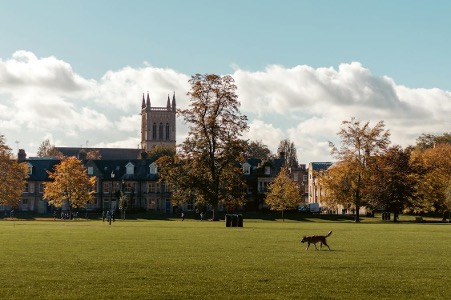Image credit: Cambridge Digital Humanities, 2023
Name
Cambridge Digital Humanities (CDH)
Year of Foundation
2017
Short Description
Established in 2017, Cambridge Digital Humanities (CDH), is an interdisciplinary research center. While CDH is primarily resided in the University of Cambridge’s School of Arts and Humanities, it is shared with the School of Humanities and Social Sciences and collaborates with other schools, unites and research centers including the University Library, Cambridge collections (University of Cambridge, 2024). Administratively, CDH is hosted by CRASSH (Centre for Research in the Arts, Social Sciences, and Humanities).
The creation of CDH reflects the University’s recognition of Digital Humanities as a strategically important area. The centre’s definition of DH work revolves around 6 main themes: the cultural, social, and epistemic impacts of digital technologies; digital research methodologies; computational humanities; digital libraries and archival-based research; digital performance, and exhibition; and research exploring cultural and social impacts of emerging technologies (University of Cambridge, 2024).
CCH is dedicated to advance, expend and promote Digital Humanities (DH) research and scholarship. It conducts research and facilitates collaborations with international partners, particularly with the Global South (University of Cambridge, 2024).
Teaching on DH
In response to DH as both a growing field of research and as an area of teaching, CDH offers comprehensive DH training through core research programs and research learning programs.
Administered by the Faculty of English, the Centre launched the MPhil in Digital Humanities program in 2022. The program is designed to equip humanities/ social science students with DH methodologies and skills necessary to engage effectively with digital research endeavours. Starting October 2024, the university will be running a PhD in Digital Humanities, allowing students to pursue advanced interdisciplinary projects at doctoral level, leveraging digital methods and tools.
Additionally, CDH provides a variety of research learning programs, including the Method Fellow programme, which focuses on developing and delivering innovative teaching in digital methods. Additionally, CHD offers short courses and themed workshop series that equip participants with essential skills in various aspects of DH. The CHD also runs a Data Schools that aims at democratising access to tools and methods for digital data collection and analysis, and at promoting ethical practices in digital research. (Source: University of Cambridge, 2024)
Key academics
Dr Anne Alexander, Senior Research Associate; Learning Director. Interested in ethics of big data, activist media in the Middle East and the political economy of the Internet. She was a part of the Ghost Fiction project.
Professor Caroline Bassett, Professor of Digital Humanities, a member of the Faculty of English; Fellow Corpus Christi; and Director of Cambridge Digital Humanities. Interested in digital media arts/media practice fields, makerspaces and galleries, critical theory, automation anxiety and refusal, black history and the digital humanities, algorithmic subjectivities, feminism, big data and algorithmic justice, Science fiction, media archaeology, net histories and more. She was part of the Ghost Fiction; and Intersections: Feminism, Technology and Digital Humanities projects.
Dr Leonardo Impett, Assistant Professor in Digital Humanities and convenor of the MPhil in Digital Humanities. Interested in computational and quantitative approaches to art and cultural history; critical computer vision, critical AI studies; historical/critical/cultural studies of training dataset and neural architectures; AI in image generation, contemporary art, and curation. He led the AI Forensics project.
Dr Hugo Leal, Teaching Associate at CDH for the MPhil in Digital Humanities; Research Associate at the Minderoo Centre for Technology and Democracy (MCTD) based in CRASSH. His work focuses on the misinformation and conspiracy theories.
Key Projects with Links
- AI Forensics
- Ghost Fiction
- Intersections: Feminism, Technology and Digital Humanities project
- The digital turn in early modern Japanese literature
- Being and Islander: Art and Identity of the large Mediterranean Islands
- Gaming the Industrial Revolution
- Computational Methods for Tracing the Evolution of Meaning in Ancient Languages
- Cambridge Merlin Fragment
- Hand in Hand Archive
- Walking the Landscape

Image credit: Pabis, 2021
剑桥数字人文中心
名称
剑桥数字人文中心
成立年份
2017
简要描述
剑桥数字人文中心(CDH)于2017年成立,是一个跨学科研究中心。
该中心位于剑桥大学的艺术与人文学院,但也与人文与社会科学学院共享。其合作伙伴包括剑桥大学图书馆、剑桥收藏等其他学院、单位和研究中心(剑桥大学,2024)。在管理上,CDH由CRASSH(艺术、社会科学和人文研究中心)托管。
CDH的创建反映了剑桥大学对数字人文作为一个战略重要领域的认可。该大学对数字人文工作的定义可分为六个类别:数字技术对文化、社会和认知的影响;数字研究方法论;计算人文学;数字图书馆和基于档案的研究;数字表演和展览;以及探讨新兴技术对文化和社会的影响(剑桥大学,2024)。
CDH致力于推动、拓展和促进数字人文(DH)的研究和学术。其目标包括开展研究项目、探索新兴研究领域,以及促进与国际合作伙伴的合作,特别是加强与全球南方地区的联系(剑桥大学,2024)。
关于数字人文的教学
针对数字人文作为一个不断发展的研究领域和教学地点,CDH通过核心研究项目和研究学习项目提供全面的数字人文培训。
由英语学院管理,中心于2022年推出数字人文硕士(MPhil)项目。该课程旨在为人文和社会科学学生提供数字人文方法论和参与数字研究所需的技能。从2024年10月开始,该大学将开设数字人文博士(PhD)项目,使学生能够在博士水平上开展先进的跨学科项目,利用数字方法和工具。
此外,CDH还提供各种研究学习项目,包括Method Fellow项目,重点是开发和提供数字方法的创新教学。此外,CDH还提供短期课程和主题研讨系列,以使参与者掌握数字人文各个方面的必要技能。CDH还举办Data Schools,旨在普及数字数据收集和分析工具和方法,以及数字研究的伦理实践(资料来源:剑桥大学,2024)。
重要学术人物
Anne Alexander博士,高级研究员;学习主任。对大数据伦理、中东活动媒体和互联网政治经济感兴趣。她是幽灵小说项目的一部分。
Caroline Bassett教授,数字人文教授,英语学院成员;基督教会哲学会院士;剑桥数字人文主任。对数字媒体艺术/媒体实践领域、制造空间和画廊、批判理论、自动化焦虑和拒绝、黑人历史与数字人文、算法主体性、女权主义、大数据和算法正义、科幻、媒体考古学、网络历史等感兴趣。她是 幽灵小说和 交叉点:女性主义、技术与数字人文项目的一部分。
Leonardo Impett博士,数字人文助理教授,MPhil in Digital Humanities召集人。对艺术和文化历史的计算和量化方法、批判性计算机视觉、批判性人工智能研究、训练数据集和神经架构的历史/批判/文化研究、图像生成中的人工智能、当代艺术和策展感兴趣。他领导了AI法证学项目。
Hugo Leal博士,CDH数字人文硕士教学助理;基于CRASSH的Minderoo科技与民主中心(MCTD)研究助理。他的工作重点是“对错误信息和阴谋论的调查,旨在追踪病毒性叙述的生命周期,它们在各个领域的战略性使用以及在社会中的影响,从排外主义的出现到科学否认”。
重要项目及链接
1. AI法证学
2. 幽灵小说
6. 工业革命游戏化
8. 剑桥梅林文献片段
9. 手牵手档案
10. 走遍山水景观
